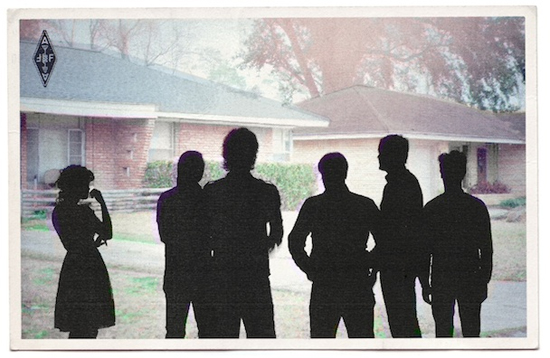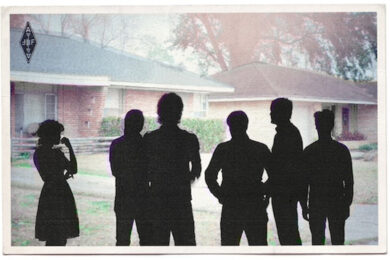It’s a little after eleven on a snow-clogged Wednesday evening, and an Arctic wind is rounding up the masses like some kind of evil ice shepherd. Huddled together against the conspiring elements, we raise hopeful heads towards the doors of North Greenwich tube and attempt to smack some life back into our cheeks, all the while doing that sideways shuffle thing that everyone in a slow-moving crowd does.
Suddenly, a wail goes up into the night: "Wooo-OOOAAH! Ooo-OOOO-oaah, ooo-ooo-OAAH!" It’s the wordless bit from ‘Wake Up’ — the Arcade Fire’s calling card number and anthem beloved of Bono — and it’s spreading like wildfire.
This crowd of thousands is on its way out of the first of two gigs from the now stadium-rocking Canadian troupe at London’s O2 Arena, and spirits are high as temperatures are ball-shrivellingly low. Shows like this tend to bring out the would-be humanist in hacks (it’s a sentimental lie we tell ourselves, of course: most writers joy of the crowd is short-lived, and swiftly curdles into misanthropy). But like it or not the band does occupy a unique place in the cultural milieu in 2010.
What’s key about Arcade Fire — and this is immediately apparent from pitch-perfect set opener ‘Ready To Start”s ominous, ringing tones — is the sense that they’re preaching here. They’re a band with populist instincts that is able to take the disparate and dispiriting sensations of modern life and still turn them into a sermon of sorts. Granted, it might be one that’s more ambivalent and confused than before, but that’s still pretty much unique nowadays. You don’t get that from Coldplay. You don’t get it from Kings of Leon. And you certainly don’t get it from arena-filling guitar plodders Kasabian.
Scritti Politti’s Green Gartside once claimed that "what I hear in Arcade Fire is an agglomeration of mannerisms, clichés and devices". That attitude is typical of a lot of naysaying that surrounds the band; a kind of ‘look at me, I-can-see-The-Matrix-behind-the-reality’ showing off that needs to be kicked swiftly into touch like the chin-stroking dullardry it really is.
For all their changing fortunes since releasing the sensational Funeral in 2004, it’s easy to forget all the things this band gets so thumpingly right. Their changing fortunes seem to reflect an atomised society’s thwarted desires for musical communion: there’s a yearning, a desperation to be let in from the cold that their anthems speak to which makes them impossible to resist. That contact is achieved tonight in the vacuous cathedral surrounds of the O2 Arena only seems apposite.
The title track from their widely-hailed new album The Suburbs is introduced as being "a song about growing up in Houston, Texas, but it might as well be London ‘cos we got the same shit going on everywhere now". And really, who can say what that means, but the song’s refrain of "sometimes I can’t believe it / I’m moving past the feeling" conveys a sense of grief at the fleetingness of the moment better than a thousand chillwave songs ever could. It’s beautiful and subtle in ways which evaded even the first record.
The old songs have charms all of their own, of course: ‘Crown of Love’ mines a richly melancholy seam, like smelling salts administered on past selves. It’s heart-rending, lump-in-throat stuff that’s immediately dwarfed by ‘Intervention’, one of the few tracks off Neon Bible where the stone-tablet portent was matched pound-for-pound by the sheer shit-the-bed levels of dread conveyed in the music. It’s introduced by a spiel from Butler about the money raised for charity through ticket purchases tonight, and a curt "God Bless by way of thanks. Then it’s all "working for the church while your family dies"… Ha! Old habits die hard, apparently.
In the ensuing lull Butler tells everyone on one side of the venue to stand up, and asks us to help him conduct a thought experiment. The goal? To "pretend we’re at a fucking rock ‘n’ roll show!" Wurgh! Seriously, though, it’s all love. Then the band launches into ‘Power Out’, still their best track for sheer visceral impact. To hear its incendiary charge like being mobilised in the service of some invisible cause, and the sight of a thousand pointed fingers in the audience arrowing straight to Win Butler’s heart at the song’s climax of "put it in… your… HANDS!" is exhilarating to say the least.
‘We Used to Wait’ pulls its weight off the newbie, lamenting the impatience of a new generation as Butler recalls waiting for letters to arrive in the post in the pre-internet age. A huge figure onstage like the bloated cadaver of a 1920s punk, he’s like Jack White in his dismay at modern manners, but is a less sternly patrician – and some might say less condescending – figure than White is. Maybe that helps explain why White’s finger-wagging approach has grown tiresome while Butler’s ‘concerned dad’ aura continues to steal hearts.
For all that The Suburbs isn’t quite the masterpiece it’s cracked on to be, and three albums in the band has yet to achieve that bulletproof setlist it surely one day will. The gorgeous ‘Modern Man’ is sadly omitted in favour of ‘Month of May”s turgid rocker, and I’ll probably get killed for saying it but the fawned-over, Regine-sung ‘Sprawl II’ sounds like a rather aimless foray into electro-pop.
Naturally the encore climaxes with ‘Wake Up”s celestial roar, with lighters replaced by the now-ubiquitous mobiles as the verses’ arduous slopes give way to world’s-end panoramas at the chorus summits. It’s these sounds that continue to echo into the freezing cold night, and into the cold, dead heart of Cameron’s Britain. Say what you like about Arcade Fire being trite or pretentious or middlebrow; at their imperious best they represent everything that’s great about popular music. And tonight’s a prime example.



